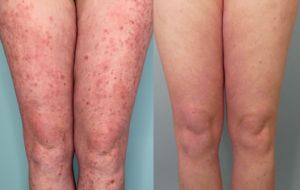Eczema, is a type of dermatitis, a common skin condition that causes skin to be red, itchy, and have inflamed patches on the skin. It often affects both children and adults and can vary in severity. Eczema is typically a chronic condition characterized by periods of flare-ups and remission. It’s important to note that eczema is not contagious but is believed to result from a combination of genetic, environmental, and immune system factors. This condition weakens the skin’s barrier function, which usually helps the skin to retain moisture and protect the body from environmental factors.
Book Your Appointment
Book Your Appointment

What is Eczema?

Types of Eczema
There can be several types of eczema based on their unique trigger factors that can affect barrier function. Some of them are:
● Atopic Dermatitis
● Contact Dermatitis
● Dyshidrotic Eczema
● Neurodermatitis
● Nummular Eczema
● Seborrheic dermatitis
There is a possibility of having more than one type of eczema at a time.
Signs of Eczema
● Itchy Skin.
● Red or Inflamed Skin
● Dry Skin
● Bumps on skin
● Flakes, scaly or crusty skin
● Swelling at times
● Thickened leathery patches on Skin
Possible Triggers
Eczema can affect different people who are diagnosed with the condition. Trigger factors can also vary for people. Some of the common trigger factors include:
● Low humidity
● Fabrics or clothing material
● Skincare or makeup products
● Smoke and pollutants
● Soaps and detergents
● Stress or depression
● Touching something one is allergic too.
Eczema can be diagnosed by physical examination of the skin, where your doctor takes a closer look. If required an allergy test or required blood test can be done. Rare cases might require a biopsy test to be done.

Causes of Eczema
● Genetic Predisposition: A family history of eczema or related conditions can increase one’s susceptibility.
● Immune System Dysfunction: Individuals with eczema often have an overactive immune response to triggers (irritants or allergens in the environment), leading to skin inflammation.
● Environmental Factors: Allergens, irritants, temperature changes, smoke, pollutants, harsh soaps, fabrics such as wool, certain skincare products, and humidity levels can contribute to eczema flare-ups.
● Emotional triggers: Mental health also has a tendency to affect health which can cause a flare-up of eczema symptoms. If someone is suffering from high stress, anxiety, or depression then that can lead to more frequent flare-ups of eczema.
● Skin Barrier Dysfunction: A compromised skin barrier makes it easier for irritants and allergens to penetrate the skin.

Treatment and Management
Treatment and management of eczema can be unique for everyone depending on the symptoms and flare-ups. This may include the following:
● Use gentle and sensitive moisturizer while you have dry flared skin. Preferably apply moisturizer when the skin is damp after a bath or shower.
● Topical Medications can be used as per prescription and recommendation of the dermatologist to manage the symptoms and flare-ups.
● Oral medications like anti-inflammatories, anti-inflammatory, or corticosteroids to reduce itchiness, rashes, or swelling.
● Immunosuppressant drugs as per prescription can help regulate the flare-ups
● Light therapies can be done to improve the skin’s appearance or blemishes
● Triggers can be noted and avoided to keep eczema under control
At Dr. Haror’s Wellness Centre we ensure to work on the root cause and trigger factors for long-term benefits and improvements.

Services Offered
Explore the diverse spectrum of services at Dr. Haror’s Wellness, where we specialize in crafting personalized experiences to cater to your individual requirements. Your transformative journey towards a ‘new you’ starts here!

Expertise personified:
Meet the Guru
Founded and led by Dr. Navnit Haror, a pioneer in aesthetic medicine. He is a dermatologist and a true expert in the art of skincare, widely recognized as a practitioner and expert in Aesthetic Surgery.
Driven by an unwavering dedication to restoring skin health, Dr. Haror's expertise shines in the innovative field of Eczema Treatment, a method celebrated worldwide. Utilizing state-of-the-art techniques and premium resources, he embarks on a transformative journey, bestowing individuals with renewed confidence. Driven by meticulous precision and a profound understanding of skin conditions, Dr. Haror tailors each Eczema Treatment to individual needs, setting a new standard for remarkable outcomes.
Dr. Navnit Haror
Gold Medalist | Dermatologist| Hair Transplant Surgeon

Our Doctors
We are founded, managed, and led by one of the world’s finest Aesthetic Surgeons, Dr. Navnit Haror and Dr. Vineeta Pathak.

Dr. Navnit Haror
Gold Medalist | Dermatologist| Hair Transplant Surgeon
Internationally acknowledged as a domain expert and practitioner of Aesthetic Surgery, Dr. Navnit Haror is a Dermatologist and Hair Transplant surgeon in practice since 2012 and is the Founder-Director of Dr. Haror’s Wellness. He has trained over 12,000 clinicians and doctors in hair transplantation techniques across 17 countries.

Dr. Vineeta Pathak
Consultant Cosmetologist | Hair Transplant & Aesthetic Surgeon
An award-winning dermatologist, Dr. Vineeta Pathak specializes in cosmetic dermatology and all aesthetic procedures. Her expertise includes vitiligo surgeries and ear lobe reconstruction, permanent hair reduction, hair transplants, lasers, and all aesthetic procedures among others.

FAQs
Empower yourself with knowledge and make informed decisions as you find answers to commonly asked questions about our services
When should I seek eczema treatment?
You should consider eczema treatment if you have persistent symptoms that affect your quality of life, such as itching, rash, and skin irritation.
Is there a cure for eczema?
Eczema is a chronic condition, and while there is no cure, treatment can effectively manage symptoms and provide long-term relief.
Can eczema treatment be used for children and infants?
Yes, eczema can affect children and infants, and there are specific treatments available for pediatric patients.
How long does eczema treatment typically last?
Some individuals may experience symptom relief with short-term treatment, while others may require ongoing management.
Are there any potential side effects or risks?
Some eczema treatments, such as topical corticosteroids, may have side effects like skin thinning if used excessively.
Can eczema be aggravated by specific foods or allergies?
Yes, some individuals with eczema may have food allergies or environmental triggers that worsen their symptoms.





